|
De Engelse dichter en literatuurcriticus Sir John Betjeman werd geboren in Londen op 28 augustus 1906. Zie ook mijn blog van 28 augustus 2009.
Verses Turned...
The church is bright with candlelight
And waiting Evensong.
A single bell with plaintive strokes
Pleads louder than the stirring oaks
The leafless lanes along.
It calls the hoirboys from their tea
And villagers, the two or three,
Damp down the kitchen fire,
Let out the cat, and up the lane
Go paddling through the gentle rain
Of misty Oxfordshire.
How warm the many candles shine
Of Samuel Dowbiggin's design
For this interior neat,
These high box pews of Georgian days
Which screen us from the public gaze
When we make answer meet;
How gracefully their shadow falls
On bold pilasters down the walls
And on the pulpit high.
The chandeliers would twinkle gold
As pre-Tractarian sermons roll'd
Doctrinal, sound and dry.
From that west gallery no doubt
The viol and serpent tooted out
The Tallis tune to Ken,
And firmly at the end of prayers
The clerk below the pulpit stairs
Would thunder out "Amen."
But every wand'ring thought will cease
Before the noble alterpiece
With carven swags array'd,
For there in letters all may read
The Lord's Commandments, Prayer and Creed,
And decently display'd.
On country morningd sharp and clear
The penitent in faith draw near
And kneeling here below
Partake the heavenly banquet spread
Of sacremental Wine and Bread
And Jesus' presence know.
And must that plaintive bell in vain
Plead loud along the dripping lane?
And must the building fall?
Not while we love the church and live
And of our charity will give
Our much, our more, our all.
Five O'Clock Shadow
This is the time of day when we in the Mens's ward
Think "one more surge of the pain and I give up the fight."
Whe he who strggles for breath can struggle less strongly:
This is the time of day which is worse than night.
A haze of thunder hangs on the hospital rose-beds,
A doctors' foursome out of the links is played,
Safe in her sitting-room Sister is putting her feet up:
This is the time of day when we feel betrayed.
Below the windows, loads of loving relations
Rev in the car park, changing gear at the bend,
Making for home and a nice big tea and the telly:
"Well, we've done what we can. It can't be long till the end."
This is the time of day when the weight of bedclothes
Is harder to bear than a sharp incision of steel.
The endless anonymous croak of a cheap transistor
Intesifies the lonely terror I feel.
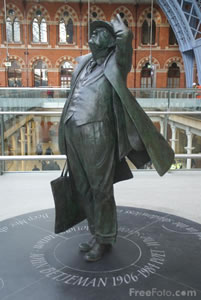
John Betjeman (28 augustus 1906 - 19 mei 1984)
Beeld door Martin Jennings bij St Pancras station, Londen
De Duitse schrijver en vertaler Elmar Schenkel werd geboren in Hovestadt (Westfalen) op 28 augustus 1953. Zie ook mijn blog van 28 augustus 2009.
Uit: Leise Drehung
Scheidungen, Taufen, Firmenjubiläen. Es hatte sich wohl herumgesprochen, dass man auf mich bauen konnte, was die Bilder anging. Ich sorgte für die gute Erinnerung. Darin erkannte ich nach und nach die Aufgabe meines Lebens. Man war ja für irgendetwas angetreten, die Gene wussten Bescheid. Meine Gene sagten: Mach ihnen etwas, damit sie bestimmte Momente im Leben nicht vergessen. Gib ihnen etwas in die Hand, damit sie zumindest glauben, dass dies ein wichtiger Moment war. Mache ihnen den Moment wichtig. Ich war kein Philosoph, jedenfalls nicht in dieser neu entstandenen Vergangenheit, ich war kein Kfz-Mechaniker, ich war kein Vertreter von biologisch
geprüften landwirtschaftlichen Produkten. Alle diese Leute versuchten, den Leuten bestimmte Momente schmackhaft zu machen: gute Autos, gute Gedanken, gutes Essen. Aber eigentlich waren das alles Ablenkungen vom Augenblick. Ich dagegen sage einfach:
»Moment mal « und schon ist etwas geschehen.
» Das mag ja alles sein «, sagte Manja. » Aber wie gesagt, ich hatte den Eindruck, dass deine letzten Bilder dich irgendwie von diesen fixierten Momenten des gesellschaftlichen Lebens abgerückt haben. Auf dem letzten Bild eines Geburtstags habe ich gesehen, dass du dem alten Mann einen Zopf angedichtet hast und seiner Mamsell einen Schnurrbart. Dich scheint der Hafer zu stechen! Ich sehe dich abstürzen mit heiß genähten Flügeln aus Wachs. Also hab ich dich angesprochen, damit du wieder für die Gesellschaft im positiven Sinne produktiv wirst. «
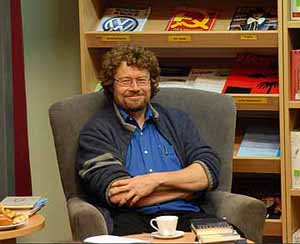
Elmar Schenkel (Hovestadt, 28 augustus 1953)
De Russische schrijver Joeri Valentinovitsj Trifonov werd geboren in Moskou op 28 augustus 1925.
Nadat zijn vader in 1937 slachtoffer werd van Jozef Stalins zuiveringen verhuisde het gezin Trifonov echter naar een onderkomen communale woning (welke later model zou staan voor het huis aan de kade), tegenover het Kremlin. Tijdens de oorlog diende Trifonov bij een Moskouse vliegtuigfabriek. Van 1944 tot 1949 studeerde hij literatuur en vervolgens wierp hij zich op het schrijverschap.
Trifonov staat bekend om zijn zogenaamde stadse proza en schetst de alledaagse problemen van het leven in de Sovjet-Unie. In de psychologische uitwerking liet hij zich sterk inspireren doos Anton Tsjechov. Bekende romans van Trifonov (ook in het Nederlands vertaald) zijn Het huis aan de kade (1972), Het andere leven (1976) en De oude man (1978).
In Het huis aan de kade beschrijft Trifonov het intellectuele klimaat tijdens de laatste jaren van Stalins bewind. Hij behandelt het leven van alledag van een Sovjet-geleerde die het uiteindelijk in de jaren zeventig tot een aanzienlijke post heeft gebracht. Daarnaast is het een geschiedenis van meerdere generaties in het huis aan de kade, hun vechten en compromissen, hun cynisme en illusies, hun zuiverheid en omgang, symbolisch voor een tijdperk.
Uit: Zeit des Zögerns (Bespreking van Die Zeit der Ungeduld" door Heinrich Böll in Die Zeit, 1975)
Eine Zigeunerin in Paris hatte dem Zaren Alexander II. prophezeit, sieben Attentate würde er überleben. Das sechste fand im Februar 1880 statt und bestätigte die Wahrsagerin: Es war dem Tischler Stepan Ghaltürin gelungen, sage und schreibe 150 Kilogramm Dynamit in das Winterpalais zu schmuggeln, und der Zar hatte diese fürchterliche Explosion überlebt. Chalturin entkam, während die Zündschnur noch schwelte; Wachsoldaten und Personal entkamen nicht. Und obwohl die Zeichen ungünstig standen (er hatte am Abend vorher beim Whist sein eigenes Bild vom Tisch gestoßen), ließ Alexander II. sich schon .wenige Wochen später, am 1. März 1880, ausfahren, um eine Parade abzunehmen und bei deiner Lieblingskusine Tee zu trinken. Wie konnte er ahnen, daß im siebten Attentat das achte enthalten war? (Ein Zwillingsattentat, das als Drilling geplant war, denn als neuntes Attentat war Scheljabows Dolchstoß in Reserve gewesen, doch war Scheljabow im letzten Augenblick verhaftet worden.) So entging der Zar dem siebten Anschlag, Ryssakows Schuß, und erlag dem achten, Grinewitzkijs Bombe, die wenige Sekunden später geworfen wurde.
Vorbereitungen und Ausführungen des geglückten Anschlags und einiger mißglückter Attentate bilden den Handlungsfaden dieses erstaunlichen Buches von - ' Jurij Trifonow: Die Zeit der Ungeduld". Trifonow begibt sich: in die spannungsgeladene Tradition russischer Langatmigkeit" und wird doch weder konventionell noch spekulativ. Man muß den Glücksfall der Übersetzung von Alexander Kaempfe hinzuzählen, wenn man sich fragt: was ist das für ein Land, für ein Volk, eine Sprache, die nicht nur den Stoff für einen solchen Roman vor der Tür liegen haben, sondern wo ein solcher Roman auch noch geschrieben wird? Wir sollten uns, denke ich, auf einiges gefaßt machen, nicht nur von Trifonow oder Woinowitsch. In Trif onows Roman wird vom Autor weder gerichtet noch hingerichtet; Trifonow hält sich an keinerlei Klischee, weder ideologisch noch in seinen Formalitäten. Er bietet keine Revolutionärs- Ikonographie und hält sich an kein gängiges Kritiker-Klischee, nach dem ein Roman in eine.bestimmte Kategorie zu gehören hat.
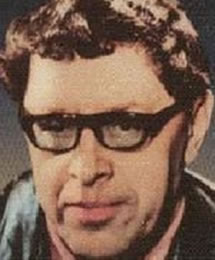
Joeri Trifonov (28 augustus 1925 28 maart 1981)
De Nieuw-Zeelandse dichteres en schrijfster Janet Frame werd geboren in Dunedin en groeide op in Oamaru. Zie ook mijn blog van 28 augustus 2006 en ook mijn blog van 28 augustus 2007 en ook mijn blog van 28 augustus 2008 en ook mijn blog van 28 augustus 2009.
Uit: Towards Another Summer
Upstairs in the attic Grace wondered at the nature of those who allow others to enter a room where their deepest secrets lie.
She sat before Philip's huge desk, considering the drawers and pigeonholes crammed with papers and letters and the Imperial Portable typewriter on the desk with a sheet of paper thrust in it, naked for all the world to see! Somewhere in one of the drawers perhaps Philip's novel lay typed and bound. How could he dare to give a stranger permission to enter this room! Or was this room not the repository of his secrets? Perhaps he himself had no access to his treasures; perhaps he hoarded them elsewhere without ever recognizing them; perhaps he discarded them one by one without ever having known them?
Telling herself that in spite of temptation it is not kind to explore the papers of another whether or not they are admitted secrets, Grace turned her attention to the window which was small, overlooking the golf course and the rigid death-posed trees that stood in their monumental anguish like the thorn trees that are the suicides in hell.
The room, Grace decided, would be a perfect place to write in, although not because of the view, for in writing the studied landscape is not the Holly Road back garden, the Winchley golf course; nor the Old Brompton Road, the car salesroom, the jet cotton-trails in the sky; it is some mysterious place out of the world's depths where the waves are penetrated by the faint gleam of the drowning sun and the last spurts of light escape like tiny sparkling fi sh into the dark folds and ceaselessly moving draperies of the water; it is the inner sea; you may look from every window in Winchley, London, New Zealand, the World, and never fi nd the Special View. Yet here, in the attic, Grace decided, little effort or encouragement would be needed to draw aside the curtains of the secret window, to smash the glass, enter the View; fearful, hopeful, lonely; disciplining o'e's breath to meet the demands of the new element; facing again and again the mermaid'n's conflict to go or stay; to return through the window whose one side is a mirror, or inhabit the blood-cave and slowly change from one who gazed at the view to one who is a part or whole of the view itself; and from there (for creation is movement) when all the mirror is a distorted image of oneself, bobbing in the dark waves with stripes of light like silver and gold bars imprisoning'one's face and body, to pass beyond the view, beyond oneself to where?
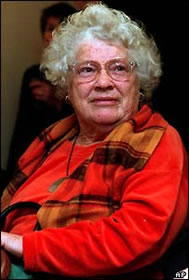
Janet Frame (28 augustus 1924 29 januari 2004)
De Canadese schrijver William Robertson Davies werd geboren op 28 augustus 1913 in Thamesville, Ontario. Zie ook mijn blog van 28 augustus 2007 en ook mijn blog van 28 augustus 2009.
Uit: Tempest Tost
Though not a large place it is truly describable as a city. That word is now used of any large settlement, and Salterton is big enough to qualify; but a city used to be the seat of a bishop, and Salterton was city in that sense long before it became one of the latter. It is, indeed, the seat of two bishoprics, one Anglican and one Roman Catholic. As one approaches it from the water the two cathedrals, which are in appearance so characteristic of the faiths they embody, seem to admonish the city. The Catholic cathedral points a vehement and ornate Gothic finger toward Heaven; the Anglican cathedral has a dome which, with offhand Anglican suavity, does the same thing. St. Michael's cries, "Look aloft and pray!"; St. Nicholas' says, "If I may trouble you, it might be as well to lift your eyes in this direction." The manner is different; the import is the same.
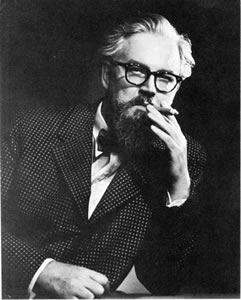
William Robertson Davies (28 augustus 1913 2 december 1995)
28-08-2010 om 19:43
geschreven door Romenu 
Tags:John Betjeman, Elmar Schenkel, Joeri Trifonov, Janet Frame, William Robertson Davies, Romenu, Heinrich Böll
|

